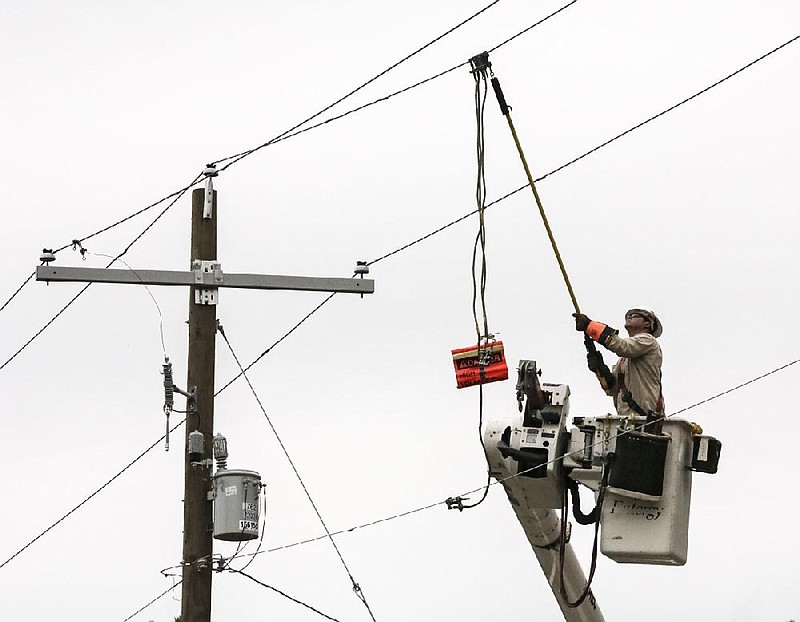The Arkansas Public Service Commission said Monday that $142 million isn't enough for the state to settle its dispute with Entergy Corp. related to cost overruns at a Mississippi nuclear plant, with the commission condemning the offer for not including a cash refund for Arkansas customers.
The commission called the offer "a low-ball amount" in a filing Monday with the Federal Energy Regulatory Commission (FERC). The federal agency is overseeing complaints from Arkansas, Louisiana and Mississippi that an Entergy subsidiary charged ratepayers too much to build and operate the controversial Grand Gulf nuclear-power facility just south of Vicksburg.
Further, the commission called on the Federal Energy Regulatory Commission to hold a hearing to examine the "continued imprudent mismanagement" of the Grand Gulf plant, which squats on the Mississippi River at Port Gibson, Miss.
The public service commission rejected the company's offer and intends to continue to negotiate with Entergy, which valued Arkansas' portion of the settlement at $142 million.
"The filing speaks for itself and we will continue to explore the possibility of a negotiated settlement," Chairman Ted Thomas said in a statement Monday.
In Monday's filing, the commission said Entergy's proposal for Arkansas would be applied to defer the costs of Entergy's fuel balance. "Nothing is said about an actual return of a cash refund to Arkansas retail ratepayers," the filing said. In addition, the commission noted the settlement does not indicate how the company plans to treat the tax effects of the settlement.
The Federal Energy Regulatory Commission is handling the case because Grand Gulf operates as a wholesale power supplier, selling electricity to Entergy Arkansas Inc. and other Entergy subsidiaries in Louisiana and Mississippi. System Energy Resources Inc. (SERI), the Entergy unit that generates and distributes power from the Grand Gulf nuclear station, is the primary entity involved in the lawsuit.
The commission's filing also notes that Entergy wants to be "released and discharged forever" for any issues that may arise related to the Grand Gulf plant. The commission said the approach is "a pretty broad statement" and is not acceptable.
Entergy Arkansas issued a statement Monday saying it wants to continue settlement negotiations with the Public Service Commission and indicated the company may be open to including compensation for state ratepayers.
"Entergy Arkansas would very much like to come to an agreement with the Arkansas Public Service Commission that benefits our customers," the statement said. "As an example, the FERC settlement reached recently with the Mississippi Public Service Commission is fair and reasonable and allows the return of considerable sums to Entergy Mississippi customers at a time when bills are high. We would welcome the opportunity to negotiate a similar outcome for Entergy Arkansas customers."
Last month, the Mississippi Public Service Commission accepted a $235 million settlement, which Entergy valued at $300 million because the company agreed to hold off rate increases that were planned for 2023. Mississippi ratepayers will receive either an $80 payment or account credit under the agreement and the state commission also said the money would offset potential natural gas price spikes.
Based on the recovery-cost structure for Grand Gulf established by the Federal Energy Regulatory Commission, Arkansas would be in line to receive the largest settlement. The regulatory commission's formula says Entergy Arkansas is responsible for 36% of Grand Gulf's operating costs for the life of the plant, which has been approved to continue to provide power until 2044. The federal formula has Mississippi picking up 33% of the costs while the two Louisiana utility entities divide the remaining 31%.
Charges related to Grand Gulf have attracted multiple complaints from state regulatory bodies. The Arkansas and Louisiana commissions also have a pending lawsuit that calls on the Federal Energy Regulatory Commission to examine and overhaul the cost-recovery formula.
The Arkansas commission urged the regulatory commission to set a hearing date for that lawsuit, which alleges "continued imprudent mismanagement of the Grand Gulf plant," Monday's filing said. "SERI fails to make any effort to tie Grand Gulf's future performance to its costs."
That lawsuit contends the cost-recovery formula for Grand Gulf should be tied to "Grand Gulf's performance, [a] refund for the costs that would not have been incurred but for SERI's mismanagement and a new ratemaking procedure to ensure that adequate economic analysis of alternatives is performed prior to making major new investments in Grand Gulf."
The lawsuit that spurred the settlement proposals began in 2017 when Mississippi regulators filed a docket with the Federal Energy Regulatory Commission charging that Entergy's return on investment for the power plant was inflated and led to unnecessary bill increases for ratepayers.
Regulators in Arkansas and Louisiana joined the complaint, which also claimed that ratepayers were charged for other unnecessary costs, including executive compensation, private airplane travel, lobbying expenses, advertisements promoting Entergy and industry association dues.
In the settlement proposal, Entergy denied any wrongdoing.
Louisiana officials have not yet indicated their preference on Entergy's settlement.
Construction of Grand Gulf began in the 1970s, and the plant was commissioned in 1985. Original cost estimates for the project were $1.2 billion but soared to more than $5 billion.
The Encyclopedia of Arkansas estimates that Arkansas electric customers were charged $4.5 billion, amounting to $6,500 per customer, for costs related to the plant from 1985-2012.

